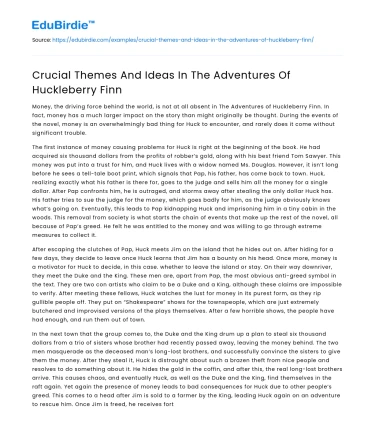Money, the driving force behind the world, is not at all absent in The Adventures of Huckleberry Finn. In fact, money has a much larger impact on the story than might originally be thought. During the events of the novel, money is an overwhelmingly bad thing for Huck to encounter, and rarely does it come without significant trouble.
The first instance of money causing problems for Huck is right at the beginning of the book. He had acquired six thousand dollars from the profits of robber’s gold, along with his best friend Tom Sawyer. This money was put into a trust for him, and Huck lives with a widow named Ms. Douglas. However, it isn’t long before he sees a tell-tale boot print, which signals that Pap, his father, has come back to town. Huck, realizing exactly what his father is there for, goes to the judge and sells him all the money for a single dollar. After Pap confronts him, he is outraged, and storms away after stealing the only dollar Huck has. His father tries to sue the judge for the money, which goes badly for him, as the judge obviously knows what’s going on. Eventually, this leads to Pap kidnapping Huck and imprisoning him in a tiny cabin in the woods. This removal from society is what starts the chain of events that make up the rest of the novel, all because of Pap’s greed. He felt he was entitled to the money and was willing to go through extreme measures to collect it.
Save your time!
We can take care of your essay
- Proper editing and formatting
- Free revision, title page, and bibliography
- Flexible prices and money-back guarantee
After escaping the clutches of Pap, Huck meets Jim on the island that he hides out on. After hiding for a few days, they decide to leave once Huck learns that Jim has a bounty on his head. Once more, money is a motivator for Huck to decide, in this case. whether to leave the island or stay. On their way downriver, they meet the Duke and the King. These men are, apart from Pap, the most obvious anti-greed symbol in the text. They are two con artists who claim to be a Duke and a King, although these claims are impossible to verify. After meeting these fellows, Huck watches the lust for money in its purest form, as they rip gullible people off. They put on “Shakespeare” shows for the townspeople, which are just extremely butchered and improvised versions of the plays themselves. After a few horrible shows, the people have had enough, and run them out of town.
In the next town that the group comes to, the Duke and the King drum up a plan to steal six thousand dollars from a trio of sisters whose brother had recently passed away, leaving the money behind. The two men masquerade as the deceased man’s long-lost brothers, and successfully convince the sisters to give them the money. After they steal it, Huck is distraught about such a brazen theft from nice people and resolves to do something about it. He hides the gold in the coffin, and after this, the real long-lost brothers arrive. This causes chaos, and eventually Huck, as well as the Duke and the King, find themselves in the raft again. Yet again the presence of money leads to bad consequences for Huck due to other people’s greed. This comes to a head after Jim is sold to a farmer by the King, leading Huck again on an adventure to rescue him. Once Jim is freed, he receives forty dollars, which is the only time that money does not have bad repercussions for Huck.
Money, in Huckleberry Finn, is an intensely negative force throughout the entire novel. It drives Huck’s quest down the river through a series of uncomfortable situations and leads him astray more than once. At the turning point in the story, when Jim is declared free, is also the only time that money is seen in a positive light. However, Huck doesn’t feel this and sets off again with nothing but the clothes on his back, and nobody else’s greed to derail him.






 Stuck on your essay?
Stuck on your essay?

